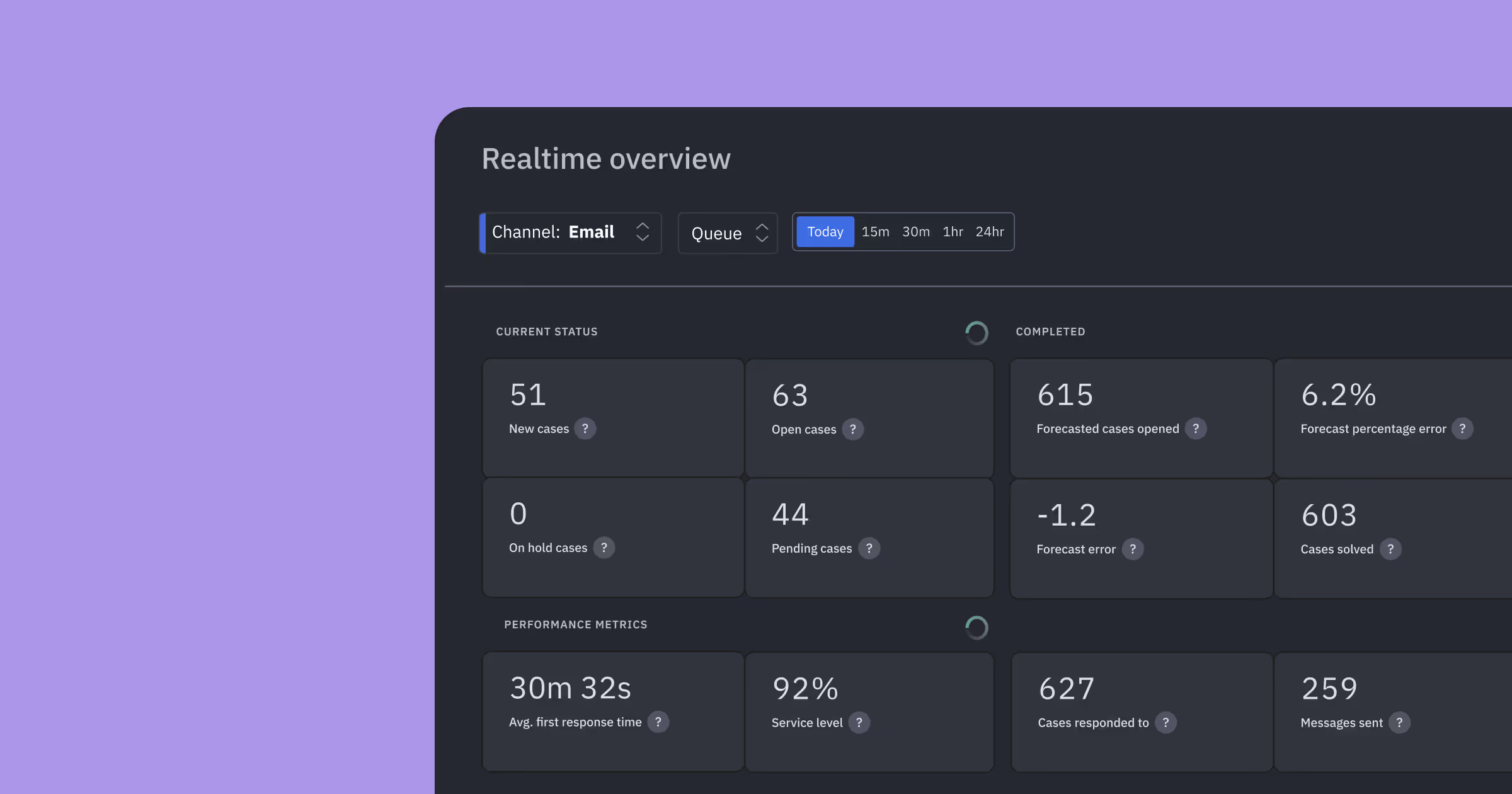Support agents time management - Assembled

Support Agents Time Management
Support agents’ time management can be a make or break skill for the success of any call center.
Every call center wants customers to be able to get through to help as quickly on a Tuesday at noon as they can at nine o'clock on a Wednesday evening. Whether your call center is focused on sales, customer service, or technical support, your customers' ability to have reliable access to the agents they need is critical to your company's success. Potential customers who can't get through to a call agent to make a purchase go to your customers. Existing customers who can't get through to customer service or technical support don't make repeat purchases and don't leave helpful reviews.
Making sure customers have access to the agents they need isn't just the responsibility of the agents themselves. Real-time management by hands-on managers is key to making sure that call agents adhere to the rules. But managers don't know how to intervene to help agents perform better without a clear process for dealing with violations and rewarding productive behaviors. And managers won't know they need to intervene if they don't get the right reports on a timely basis.
Monitoring call agent performance can't be an occasional thing. Many call centers measure time management on a monthly basis, but the ability to track support agents' time management on a more intensive basis, not just weekly or daily but by the hour or by the fraction of an hour, is an essential tool for call center managers.
Call Center Policies
How do call centers typically address call agent time management at a policy level? And who makes call center policy?
Whether a call center is just starting up or it has been operating for decades, there are certain essential policies that protect the center and its employees from major disruptions. Here are a few areas of policy every call center must consider:
- NDA. Every employee of every call center needs to sign a non-disclosure agreement. The agreement needs to cover customer information, business information, and technical information. No customer data and no business-critical information should ever leave the workplace. Employees at all levels need to understand their responsibilities under their NDA and what to expect if they violate it.
- Social media engagement. It's fine for employees to post positive things about where they work. But no employee should be allowed to post negative comments about your call center on social media. Nor should they represent themselves as spokespeople for your company if they do not hold that position.
- Background checks. Your call center should run background checks on employees as part of their hiring process. If you don't have background checks on existing employees, you should secure consent to run them.
There are other call center policies that ensure smooth day to day operations:
- Consent to audio-visual recording. A-V recording isn't some kind of dastardly collection of call center call handling procedures that call centers use to catch agents doing something wrong. A-V recording is something call centers do to keep call agents safe. Without written consent, your A-V recordings may not be admissible in a legal proceeding, so it's imperative to get consent from everyone on your staff.
- Attendance policy. There should be no gray areas in attendance policy. Every employee should know what your call center's attendance policy is and what the rewards of good attendance will be for them.
- Some call centers also need policies regarding dress code, drug and alcohol use, and wearing ID badges.
Now let's take a look at the nitty-gritty issue of average handle time (AHT).
High AHT Reasons
Average handle time, which is also known as AHT, is a measure of the average time for a customer encounter with a call center, beginning with the customer's dialing the call center number, and including time spent on hold and time during transfers, time speaking with the agent, the closing of the call, and any follow up work the agent has to do after the call.
There is a very simple reason that AHT is an important focus of management attention:
- Customers who have a bad experience with call centers take their business elsewhere. A survey sponsored by Microsoft found that 51% of customers who have a single bad experience with a call center never do business with that company again.
AHT isn't just a key metric in measuring the customer experience. It also is a measure of operational efficiency, customer satisfaction (CSAT)l, and agent effectiveness. High AHT on the agent level is a warning sign that an agent isn't providing callers with the kind of experience that keeps them as customers. And high AHT on the call center level affects multiple key performance indicators that managers need to make to keep their own jobs.
Typical high AHT reasons include hold time, dead air, and escalations to supervisors. But meaningful AHT tips for agents aren't on the lines of "Don't keep callers on hold," "Never let your caller sit through dead air," and "Don't escalate to your supervisor."
The most frequent cause of high AHT is handling negative interactions with customers. The kinds of AHT tips for agents that get measurable results are coaching agents with empathy statements and de-escalation tactics. Side-by-side micro-training sessions with call agents on how to reduce AHT in chat and how to reduce wrap time in call center transactions also help reduce high AHT (or identify employees who should be redirected to other responsibilities).
Of course, every call agent and every call center needs a fast-loading, easily navigated internal knowledge base with answers to the questions that arise in customer calls. Without access to answers without consulting the supervisor, efforts to address high AHT will be slow to pay off.
Time Management Skills
Beyond good policy and appropriate manager intervention, what are the time management skills in customer service reps that HR should look for?
Time management skills for call agents and time management skills for managers display themselves in similar ways. Call agents and call center managers who have good time management skills usually:
- Show up for appointments on time. Accidents happen. Everyone is late occasionally because of reasons beyond personal control. But call center employees who have great time management skills can be depended on to make their appointments on time.
- Say "no" as appropriate. Call center employees who have great time management skills say "no" to avoidable distractions on the job. That doesn't mean that they work through breaks, come in early, or stay late. It just means that they keep their position covered when they are on shift.
- Usually have their work done ahead of time. Employees who chronically finish assignments at the last possible moment, if they aren't exceeding expectations otherwise, often have issues with time management skills.
- Complete tasks in the time expected for completing them. It's important for managers to aim for AHT appropriate for their industry. Different kinds of calls will have different AHTs. But employees, whether they are call agents or call center managers, need to be bringing AHT down not sending it up.
- Time management skills examples should be promoted by every manager. It is important to recognize and reward good time management.
Time Management Strategies
At the manager level, some very basic time management strategies help to reduce AHT.
It's important to minimize social interactions between call center agents while they are on the phone. Simply paying attention to desk assignments may be enough to address this issue. Scheduling employees on different shifts is sometimes necessary for keeping agents who are otherwise promising.
Call agents turn to managers for prioritizing their responses to customer calls. Simply making sure that every agent knows what to do first saves time and reduces AHT.
Managers can prevent multitasking. It's inevitable that some calls will require complicated wrap-up and some agents will move to the next call before they have completed the last one. Managers can apply call center policy to help agents through rough patches with difficult customers or technology glitches.
And managers can make sure that everyone gets time management training. There's a lot about effective and efficient customer service that isn't intuitive. Bringing in experts from outside the team and giving employees occasional time management training time prevents agents from getting into a rut and helps your call center retain employees.
Time Management Tips
Some tested and true time management tips for customer service reps include:
- Start your day with quick wins. Every call agent has some tasks that aren't conducted on the phone, and some phone work that is easier than others. Completing administrative paperwork, reading and responding to company email, and returning customer calls as soon as possible in the shift gives the agent a sense of accomplishment that makes the whole shift easier.
- Plan ahead. When call center agents have been on the job for a few weeks to a few months, they begin to notice patterns in calls. It's a good idea to write out a plan for dealing with the kinds of calls the agents get most often. (The agent should do this, not the manager.) Then agents should keep a copy of their plans at their workstations to make sure they follow through on each call. This technique is especially useful for learning empathy statements and de-escalations.
- Prepare an FAQ cheat sheet. If certain questions come up over and over again and access to the call center's knowledge base isn't dependable, there's nothing wrong with keeping a cheat sheet of answers to frequently asked questions. This is something call agents should keep in their lockers at work rather than taking home with them.
- Take your breaks. Working through breaks doesn't make call agents more productive. It makes them less productive. Getting away from the phone periodically helps agents get through calls more smoothly.
- Call agents and call center managers alike can come up with their own time management tips for work. Make sure that everyone has an opportunity to share what they are learning from time to time in group meetings.
Call Avoidance Policy
All of these time management strategies don't work if the call center doesn't have a clear call avoidance policy in its call center rules and regulations for employees. Call avoidance policies are an essential part of every call center operations manual.call center standard operating procedures
Call center standard operating procedures usually include making sure:
- No agent takes the phone off the receiver so incoming calls cannot be received except in specific circumstances with clear time limits.
- No agent takes excessive breaks.
- Transfers to other agents occur under clear procedures so they are minimized, and agents don't remain in conference mode after they transfer their calls.
- Agents don't spend too much time on easy calls so they can avoid hard calls.
- Agents don't intentionally spend excessive time in wrap-up work.
- Agents don't take excessive breaks.
It's not enough to have a clear call avoidance policy. Agents need to be given the tools they need to deal with difficult customers so they won't avoid their calls. Don't look at call avoidance as a reason to penalize employees. Use call avoidance as an occasion for effective call center training.





